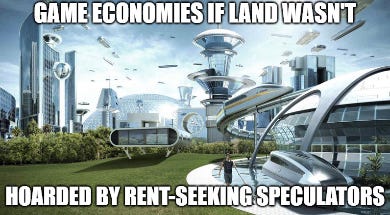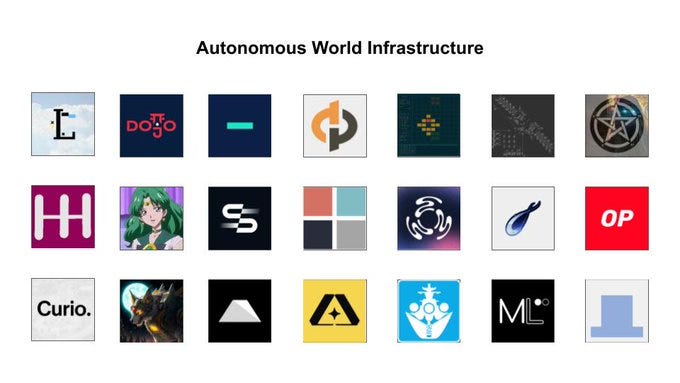All about game economies | Skill Tree #23
Feedback loops in game economies
Summary
definition of feedback loops: the result of a mechanism influences the same or another mechanism (output acts as input)
e.g. mine iron to build an iron pickaxe to mine iron faster
feedback loops can span over multiple mechanisms
positive feedback loops
pro: can motivate the player, granting a sense of growth and empowerment
con: can disrupt game balance e.g. have dominant strategy; progression too fast (e.g. large gap between old and new players)
negative feedback loops can be used to balance the economy by weakening the positive feedback loop (e.g. cost of crafting pickaxes increases)
con: undermine player growth
randomness is also important to prevent dominant strategies from emerging. also adds an element of risk
randomness can also be introduced by adding social elements, e.g. players can steal iron from others
Bid-based land value tax
Summary
Problems with land
Often have strong utility which leads to speculation around these assets. This may price out real users, meaning productive assets end up in the hands of unproductive participants
Land allows for rent-seeking, introducing economic inefficiency
comment: Land assets with uncapped ROI allow for passive value extraction which can undermine economic balance. The more actual users get priced out, the less value the land can accrue long-term, as it usually taxes productive use. In the end, the whole system collapses.
Extisting mechanisms
Land value tax: Seaparates the value of the base land from all improvements built on top (e.g. houses). Only the land gets taxes, disincentivizing speculation on land without productive use.
Requires valuations methods, like the following:
Comparable assessment: value the land based on sales of comparable assets. Can build a regression model that determines how much each attribute (e.g. location, size) contribute to the land value
complex, can be exploited via wash trading
comment: there are a couple of ways to account for wash trading but all of them are imperfect. For example, one could only count land NFTs that have been publicly available for a certain period, which helps to minimize the impact of wash-trading items for too cheap (but not overpricing) as someone else could have sniped the undervalued assets, introducing risk to wash trading. Another mechanism would be to cut off all trades below the first and above the third quartile. Or reducing the weight of assets in the formula which get traded significantly more than similar items. which can be an indicator for wash trading when it’s the same assets (harder in a concentrated market)
Leases: Land can be bought but only leased. Periodically, leases get auctioned off to the highest bidder (e.g. via a Vickrey auction)
opposes the goal of true ownership
comment: vickrey auctions can be manipulated by the game developer via shill bids to keep effective prices high
Harberger taxes: Holders value the land themselves. The land can be bought by another person at that price, incentivizing holders to voice the real value the asset has for them
poor user experience as they can lose their land anytime and have to re-assess its value regularly; self-assessment is difficult
impossible to plan longer-term projects which can add value to the economy but require assurance that the user can hold the land for xy period of time to warrant and recoup the investment
modification: optional-sale Harberger tax (holder can accept or reject a bid. if rejected, has to pay tax at the new valuation)
Depreciating license: A mixture of Harberger taxes (taxes are based on resale value) and leases (regular auction set by government). Asset depreciates by a certain percentageannually. The government auctions off the “depreciated” part and the asset owner either purchases that percentage back or someone else purchases that part from the government and the rest from the current holder.
Bid variation to Harberger taxes: Holders prepay money for taxes into a contract. Others can bid on the land (fully collateralized) with the highest bid serving as the valuation. The holder can also decide to sell the asset to the highest bidder
requires buy-side liquidity for valuation
pre-payment and collateralized bidding are capital inefficient
Bid-based Land Value Tax
Similar system to the bid variation
Changes
separate bid for land and bid for improvements on top. tax only based on the land value
allocate part of the tax revenue to the highest bidder to incentivize a liquid buy-side market and increase efficiency & price discovery
pre-payment not needed, contract can be filled just-in-time, at specific intervals → increases capital efficiency. if the payment is missed, either liquidate automatically or reduce utility until debt is paid. Can also set an interest on the debt
Bids however still need to be fully collateralized (capital inefficient)
General comment on Land Value Tax (LVT): LVT can help build a more productive economy and increases revenue for developers. A potential tradeoff is the risk of productivity maxxing. Only the most productive players hold land as they can pay the highest tax. But making land ownership so competitive isn’t fun for less competitive player types (most players). If the land is scarce and only an element for a small group of players, land value tax is a powerful mechanism though.
Are game economies meant to die?
I wrote down some thoughts on how I think crypto-economics as a discipline may develop





